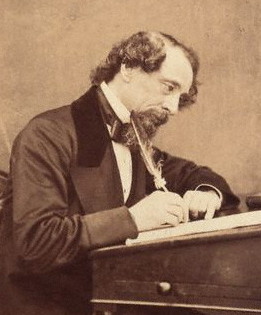-
Hello everybody,
This week, we learnt how to say what time it is.
Friday, January 15th
(the fifteenth)
Learning time
08:45
It's quarter to nine.
06 :30
It's half past six.
07 :24
10 :00
04 :50
It's twenty-four past seven.
It's ten o'clock.
It's ten to five.
Play this game! CLICK HERE
HOMEWORK: Tuesday, 19th: revise time (être capable de lire n’importe quelle horloge ou de l’écrire)
Listen to the song : SONG
 votre commentaire
votre commentaire
-
Hello everybody,
Yesterday, we created a lot of questions to talk about Charles Dickens's life. We wrote them in the preterit.
We used pronouns (what, when...), auxiliaries (was, did).

Tuesday, January 12th
(the twelfth)
Questions about Dickens’s life
1) What was his job ?
When did he start writing ?
What did he do?
2) Where/When was he born?
3) Where/When/Why did he move?
4) How many hours did he work in a factory?
How old was he when he began working in a factory?
Why did he work in a factory?
5) When did he become famous?
6) How many children did he have?
7) When did he divorce?
8) When did he die?
HOMEWORK: Thursday 14th: learn questions n°2/5/8
 votre commentaire
votre commentaire
-
Hello everybody,
Today, we created a lot of questions to talk about Charles Dickens's life. We wrote them in the preterit.
We used pronouns (what, when...), auxiliaries (was, did).

Questions about Dickens’s life
1) What did he do/write?
What was his job?
2) When and where was he born?
3) Where did he move? When did he move to London?
4) Where did he work? How old was he?
5) When did he become famous?
6) How many children did he have?
7) When did he divorce?
8) When did he die?
HOMEWORK: Thursday 14th: learn questions 2/5/8
 votre commentaire
votre commentaire
-
Hello everybody,
Today, we corrected your English test.
Then, we completed a document about expressing your opinion and the future.
Correction:
EXERCISE 1 : Cinderella’s actions : Fais quatre phrases pour dire ce que Cendrillon est en train de faire (base toi sur les images). Cinderella is fixing the breakfast.
She is washing the dishes.
= présent be + V-ing
EXERCISE 2 : Cinderella’s habits : Fais quatre phrases pour dire ce que Cendrillon fait tous les jours, tous les matins, tout le temps, toute la journée.
Cinderella always does the mopping.
Every day, she makes the fire.
= présent simple (on conjugue la 3è p. du singulier avec S ou –ES)
EXERCISE 3 : Predict the future : Prédis le futur de Cendrillon (2 phrases minimum)
Cinderella will be a princess.
= Prédire le futur avec « WILL + BV ».
EXERCISE 4 : HOUSEWORK : Utilise les images ci-dessous pour :
My brother hardly ever makes his bed.
I never help with the cooking.
EXERCISE 6 : Vocabulary :
- Coudre : Sew (se prononce sow).
- Du fil : thread
- Une aiguille : a needle
- Passer la serpillère : do the mopping
- Faire du feu : make the fire
- Beugler : holler
- 2 places libres : mots de la leçon au choix :
Vacuum : passer l’aspirateur / Une robe de bal : a ball dress/gown.
Homework:
Sign the test
Correct the test
Learn the document
 votre commentaire
votre commentaire
-
Hello everybody,
During the last lessons, we finished working on the videos of Malaki.
Then, we did a special activity. Everybody had a different word/group of words.
You had to form groups with other pupils to create sentences:
Monday, January 11th
(the eleventh)
Class activity: form groups and form sentences
Group 1: I suppose the jury will not buzz him.
Group 2: I believe the audience won’t throw tomatoes and eggs.
Group 3: I guess his mother will win the competition.
Group 4: I think the jury won’t feel sad.
Group 5: I believe Malaki won’t sing again.
HOMEWORK: Tuesday, 12th: learn the lesson (2 examples minimum).
Tuesday, January 12th
(the twelfth)
The final videos about Malaki
Malaki is very nervous, he has a stage fright.
So, his mother is backstage and she encourages him.
She says: “Think I’m here, backstage”. She also says “go, Malaki, yes, Malaki!” .
A member of the jury, David, says to Malaki: “You’re a star!”.
The jury only says positive things to him.
The audience cries too / is happy / is moved.
The jury gives him four “yeses”.
He thanks the jury.
HOMEWORK: 14th: Learn vocabulary from the lesson + conjugaison.
 votre commentaire
votre commentaire






